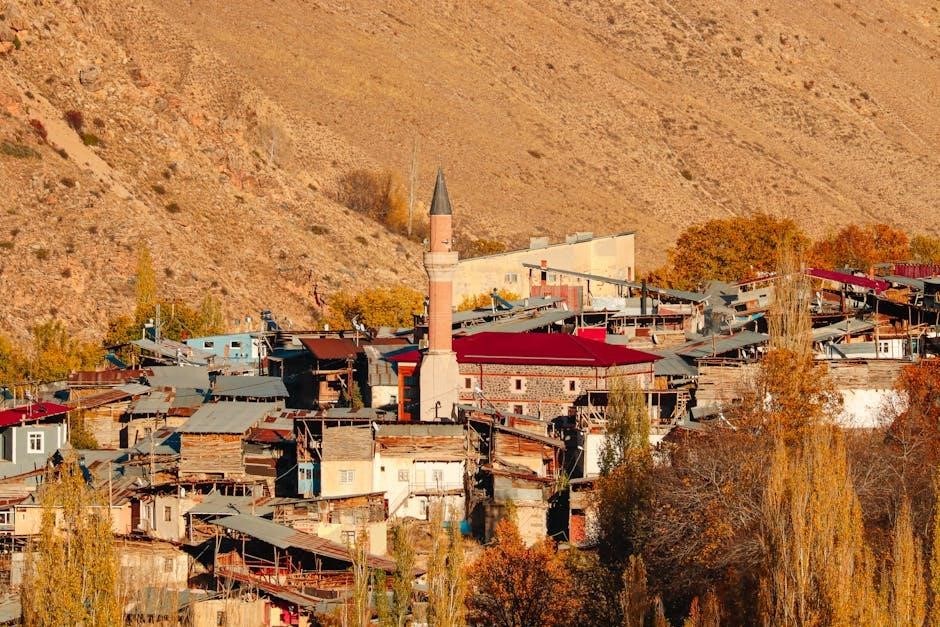
the road pdf 287 pages
Cormac McCarthy’s The Road is a haunting post-apocalyptic novel, widely acclaimed for its emotional depth and stark prose. The 287-page edition remains a pivotal work in modern literature, exploring survival, hope, and morality in a devastated world. Its graphic novel adaptation and film version have further cemented its cultural impact, making it a timeless exploration of human resilience.
1.1 Overview of the Novel
The Road by Cormac McCarthy is a post-apocalyptic tale of a father and son navigating a barren world. Published in 2006, the 287-page novel explores themes of survival, hope, and morality. Its sparse prose and haunting imagery depict a world devoid of resources and humanity. The story follows their perilous journey, emphasizing the bond between parent and child. The novel’s emotional depth and stark realism have made it a modern classic, earning McCarthy the Pulitzer Prize and widespread acclaim.
1.2 Historical Context and Background
Cormac McCarthy’s The Road was published in 2006, a time of heightened global anxiety about climate change and nuclear threats. The novel reflects post-apocalyptic fears, resonating with societal concerns about environmental collapse. Its 287-page narrative captures a world stripped of resources, echoing real-world worries. McCarthy’s work aligns with a tradition of dystopian literature, offering a stark vision of human survival. The novel’s release coincided with growing interest in apocalyptic themes, cementing its relevance in contemporary literary discourse.
Background and Publication History
Cormac McCarthy’s The Road was published in 2006, earning the Pulitzer Prize. The 287-page edition remains a significant literary work, reflecting its enduring impact and acclaim.
2.1 Publication Details and Editions

Cormac McCarthy’s The Road was first published in 2006 by Alfred A. Knopf. The novel spans 287 pages, a format retained across various editions, including hardcover, paperback, and e-book. The PDF version, widely circulated, maintains the original structure and content, ensuring accessibility for modern readers. This edition has become a standard reference, reflecting the novel’s enduring popularity and critical acclaim. Its concise yet powerful narrative continues to resonate, solidifying its place in contemporary literature.
2.2 Cormac McCarthy’s Intentions and Inspirations
Cormac McCarthy’s The Road explores human resilience and morality in a post-apocalyptic world. Inspired by themes of survival and hope, McCarthy crafts a haunting narrative through minimalist prose. The father-son relationship at its core reflects his exploration of paternal love and protection amidst devastation. McCarthy’s intent was to provoke reflection on existence, stripped of societal comforts, highlighting the essence of humanity in extreme circumstances.
Major Themes in “The Road”
The Road explores survival, hope, and morality in a post-apocalyptic world. The 287-page novel delves into human resilience, the father-son bond, and ethical dilemmas in extreme conditions.
3.1 The Struggle for Survival
In the 287-page edition of The Road, survival is a relentless, daily battle. The father and son navigate a barren, post-apocalyptic world, scavenging for food and avoiding danger. The novel vividly portrays their physical and emotional struggles, emphasizing the primal instinct to survive. McCarthy’s stark prose underscores the harsh realities of their existence, where every decision is a matter of life and death. This theme dominates the narrative, highlighting humanity’s resilience in the face of unimaginable adversity.
3.2 The Role of Hope in a Post-Apocalyptic World
In the 287-page edition of The Road, hope emerges as a fragile yet enduring force. Amidst the desolation, the father and son cling to the promise of a better future, symbolized by their journey south. McCarthy portrays hope as a necessity, sustaining them through unimaginable hardships. The bond between the characters serves as a beacon of light, illustrating how hope, though tested, remains a vital component of humanity’s survival in a shattered world.
3.3 Morality and Ethics in Extreme Circumstances
In the 287-page edition of The Road, McCarthy explores morality and ethics through the father and son’s struggles. The father’s protective instincts often clash with the harsh realities of their world, raising questions about right and wrong. The son’s innate sense of morality contrasts with the lawlessness around them, highlighting the tension between humanity and survival. McCarthy’s portrayal of these dilemmas underscores the complexity of maintaining ethical standards in a world devoid of societal norms and governance.

Literary Style and Structure
Cormac McCarthy’s The Road features minimalist prose and a non-linear structure, enhancing the emotional impact of the father-son journey in a bleak, post-apocalyptic world.
4.1 McCarthy’s Unique Prose and Language
Cormac McCarthy’s prose in The Road is sparse, evocative, and deeply haunting. His minimalist style mirrors the desolate world, with short, direct sentences that amplify the novel’s emotional weight. The absence of quotation marks for dialogue creates a seamless narrative flow, while vivid imagery paints a stark, post-apocalyptic landscape. McCarthy’s language is both brutal and poetic, reflecting the harsh realities of survival and the enduring bond between father and son. This unique style underscores the novel’s themes of hope, morality, and resilience.
4.2 The Structure of the Novel and Its Impact
The Road’s structure is deliberately fragmented, mirroring the chaos of its post-apocalyptic world. McCarthy employs a non-linear narrative, blending flashbacks with the present to deepen emotional resonance. The lack of chapter divisions creates a sense of relentless momentum, drawing readers into the father-son journey. This form enhances the novel’s themes of survival and hope, as the structure itself reflects the characters’ precarious existence. The 287-page edition maintains this impactful format, ensuring a visceral and immersive reading experience.

Character Analysis
The father and son embody resilience and hope in Cormac McCarthy’s The Road. Their bond and moral growth are central to the novel’s emotional impact.
5.1 The Father: His Role and Development
The father in The Road is the embodiment of resilience and sacrifice. His primary role is to protect his son in a harsh, post-apocalyptic world. Throughout the 287-page novel, his character evolves from a man driven by survival instincts to one who clings to humanity. His moral struggles and unwavering commitment to his son highlight his complex development. The father’s eventual death symbolizes the end of their journey, leaving the son to navigate the world alone, carrying the lessons of survival and morality he imparted.
5.2 The Son: Symbolism and Growth
The son in The Road symbolizes hope and innocence in a desolate world. His growth throughout the 287-page novel is profound, as he transitions from a naive child to a morally aware individual. The father’s teachings shape his understanding of right and wrong, emphasizing humanity’s enduring values. The son’s interactions with his father highlight his capacity for empathy and compassion, even in the face of extreme adversity. His journey reflects the resilience of innocence in a shattered world, leaving readers with a glimmer of hope for humanity’s future.
Symbolism in “The Road”
The 287-page novel uses the road as a symbol of journey and destiny, while fire represents hope and survival, central themes in McCarthy’s haunting narrative.
6.1 The Road as a Symbol of Journey and Destiny
The road in Cormac McCarthy’s novel serves as a powerful symbol of both physical and existential journey. It represents the father and son’s relentless path through a devastated world, embodying their search for survival and meaning. The 287-page narrative underscores the road as a metaphor for destiny, guiding the characters through unimaginable hardships. Its presence is both a literal route and a symbolic representation of their unyielding will to persevere, even in the face of catastrophic loss and moral decay.
6.2 Fire as a Symbol of Hope and Survival
Fire in The Road symbolizes hope and survival, contrasting the cold, dark world. The father and son use it for warmth and cooking, embodying resilience. Its light represents humanity’s enduring spirit, a beacon in despair. The 287-page narrative highlights fire as a lifeline, connecting them to their past and offering a fragile sense of normalcy. This elemental force underscores their determination to survive, even as the world around them crumbles, making it a poignant symbol of hope amidst devastation.

Moral Dilemmas and Choices
In the 287-page novel, the father and son face stark moral choices, such as theft and trust, to survive. These dilemmas highlight humanity’s struggle between compassion and self-preservation.
7.1 The Father’s Moral Struggles
The father in Cormac McCarthy’s The Road grapples with profound moral dilemmas, balancing survival instincts with humanity. His choices, such as stealing food, reflect a desperate struggle to protect his son while maintaining a semblance of morality. The novel’s 287 pages vividly portray his internal conflict, as he navigates a world devoid of rules, forcing him to confront the limits of his own ethics and the sacrifices required to ensure their survival in a harsh, post-apocalyptic landscape.
7.2 The Son’s Innocence and Moral Awareness
The son in The Road embodies innocence and moral curiosity, questioning the harsh realities of their post-apocalyptic world. His naive yet profound inquiries about humanity and justice highlight his untainted perspective. The father’s teachings guide him, emphasizing the importance of goodness amidst despair. The son’s moral awareness contrasts sharply with the brutality around them, symbolizing hope and the enduring potential for humanity’s redemption. This dynamic is central to the novel’s emotional depth, as captured in its 287 pages and recognized by its Pulitzer Prize accolades.
Adaptations of “The Road”
The Road has been adapted into a graphic novel by Manu Larcenet and a film starring Viggo Mortensen, both capturing the novel’s bleak yet profound narrative, as detailed in its 287 pages.
8.1 The Graphic Novel Adaptation

The graphic novel adaptation of The Road, illustrated by Manu Larcenet and authorized by Cormac McCarthy, brings the haunting story to life through visual storytelling. This adaptation stays true to the novel’s themes of survival, hope, and morality, capturing the bleak post-apocalyptic world in stark detail. The graphic novel covers the entirety of the 287-page original, ensuring fans experience the full emotional depth of McCarthy’s work. Its release marks a significant expansion of the novel’s reach, introducing it to new audiences while maintaining its core essence.
8.2 The Film Adaptation and Its Reception
The film adaptation of The Road, directed by John Hillcoat and starring Viggo Mortensen, premiered in 2009. It faithfully captures the novel’s bleak atmosphere and emotional depth, staying true to Cormac McCarthy’s vision. The movie received widespread critical acclaim for its raw portrayal of survival and hope. While it didn’t achieve major box office success, it solidified the novel’s impact on popular culture, offering a visual interpretation of the 287-page story that resonated with audiences and critics alike.
Critical Reception and Awards
Cormac McCarthy’s The Road earned the Pulitzer Prize for Fiction, receiving widespread acclaim for its profound exploration of human resilience in a post-apocalyptic world, as seen in its 287-page narrative.
9.1 The Pulitzer Prize and Its Significance
Cormac McCarthy’s The Road won the Pulitzer Prize for Fiction in 2007, a testament to its profound impact. The 287-page novel’s exploration of survival, hope, and morality resonated deeply, earning widespread critical acclaim. This prestigious award solidified McCarthy’s reputation as a master of contemporary literature, highlighting the novel’s ability to evoke raw emotion and philosophical reflection. The Pulitzer Prize not only recognized the book’s literary excellence but also underscored its relevance in exploring humanity’s resilience in the face of catastrophic collapse.
9.2 Reviews and Critiques from Prominent Sources
The Road received widespread acclaim from major publications, with The New York Times praising its haunting prose and emotional depth. Critics highlighted McCarthy’s ability to convey the human condition through sparse, powerful language. The novel’s exploration of survival, hope, and morality resonated deeply, earning it a place among modern literary masterpieces. Its 287-page edition has been celebrated for its unflinching portrayal of a post-apocalyptic world, solidifying its status as a cultural and literary landmark.

Cultural Impact and Legacy
The Road has left an indelible mark on literature and popular culture. Its 287-page edition, along with graphic novel and film adaptations, continues to inspire and influence contemporary storytelling, cementing Cormac McCarthy’s legacy as a visionary writer.
10.1 The Novel’s Influence on Popular Culture
The Road has profoundly influenced popular culture, inspiring adaptations like a graphic novel by Manu Larcenet and a film starring Viggo Mortensen. Its bleak yet powerful narrative resonates across media, from music to visual arts, sparking discussions on survival and ethics. The 287-page edition’s themes of resilience and hope continue to captivate audiences, solidifying its impact on contemporary storytelling and beyond.
10.2 The Legacy of Cormac McCarthy’s Work

Cormac McCarthy’s work, including The Road, has left an indelible mark on literature and popular culture. His unique prose and exploration of human resilience continue to inspire adaptations, from graphic novels to films. The 287-page edition of The Road remains a testament to his mastery of storytelling. McCarthy’s legacy endures, influencing new generations of writers and artists, ensuring his work remains relevant and impactful long after his passing in 2023.

The Ending of “The Road”

The novel concludes with the father’s death, leaving the son to confront an uncertain future. The boy’s encounter with a new family offers a glimmer of hope, resonating emotionally and thematically, leaving readers to ponder humanity’s enduring spirit amidst devastation.
11.1 Interpretations of the Conclusion
The ending of The Road sparks diverse interpretations. Some view the son’s encounter with a new family as a hopeful renewal, symbolizing humanity’s resilience. Others see it as ambiguous, questioning the family’s true intentions and the world’s future. The open-ended conclusion leaves readers contemplating themes of survival, hope, and morality, reflecting McCarthy’s exploration of human endurance in a shattered world. The 287-page edition’s final pages underscore the novel’s emotional and thematic depth, leaving a lasting impact on its audience.
11.2 The Ending’s Emotional and Thematic Resonance
The conclusion of The Road evokes profound emotional and thematic resonance, leaving readers reflecting on hope, survival, and humanity. The father’s death and the son’s encounter with a new family symbolize both loss and renewal. The ambiguous ending underscores the novel’s exploration of resilience and morality, resonating deeply with its audience. The 287-page edition’s final pages encapsulate McCarthy’s poignant vision, lingering in readers’ minds as a powerful commentary on human endurance and the enduring cycle of life.
The PDF Version and Its Significance
The 287-page PDF of The Road faithfully preserves McCarthy’s original text, ensuring accessibility in the digital age while maintaining the novel’s emotional and thematic integrity.
12.1 The 287-Page Edition and Its Features
The 287-page edition of The Road in PDF format is a faithful digital representation of Cormac McCarthy’s original novel. It preserves the text’s integrity, maintaining the stark, haunting prose that defines the story. The PDF version ensures accessibility, allowing readers to engage with the narrative in a modern, convenient format. Its features include the complete, unabridged content of the novel, making it an essential resource for both casual readers and academic studies. The format remains true to McCarthy’s vision, offering an unaltered reading experience.
12.2 The Importance of the PDF Format in Modern Reading
The PDF format has become a cornerstone of modern reading, offering unparalleled accessibility and convenience. It allows readers to access texts like The Road on various devices, ensuring portability and ease of use. The format preserves the original layout and typography, maintaining the author’s intent. For academic and casual readers alike, PDFs provide a reliable way to engage with literature, fostering a seamless reading experience in an increasingly digital world. This versatility underscores its enduring relevance in contemporary reading habits.
Conclusion
Cormac McCarthy’s The Road remains a profound exploration of survival, hope, and humanity. The 287-page PDF edition ensures its timeless message reaches modern readers, preserving its emotional and thematic resonance for future generations.
13.1 Summary of Key Points
Cormac McCarthy’s The Road is a Pulitzer Prize-winning novel exploring survival, hope, and morality in a post-apocalyptic world. The 287-page edition remains a cornerstone of modern literature, offering a bleak yet profound narrative. Its themes of human resilience and ethical dilemmas resonate deeply. Adaptations, including a graphic novel and film, have expanded its reach. McCarthy’s unique prose and the novel’s emotional depth ensure its lasting impact, making it a seminal work in contemporary fiction.
13.2 Final Thoughts on the Novel’s Relevance
The Road remains a powerful exploration of human resilience and morality, offering timeless reflections on survival and hope. Its 287-page edition, adapted into graphic novel and film formats, ensures its message reaches diverse audiences. McCarthy’s prose captures the essence of a shattered world, provoking deep contemplation on humanity’s future. The novel’s relevance endures, making it a vital read for understanding existential crises and the enduring strength of the human spirit in the face of catastrophe.